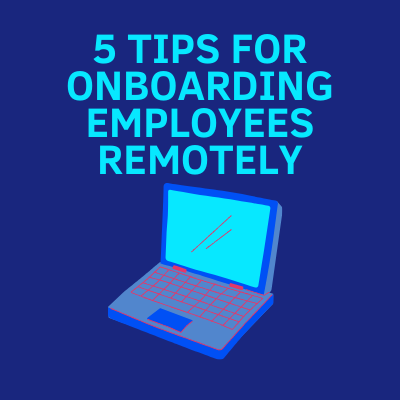
The coronavirus disease 2019 (COVID-19) pandemic has caused employers to make significant changes to their business practices, including onboarding. Managers and new hires across the country are navigating the unchartered waters of remote onboarding.
The onboarding process—which is designed to cultivate a long-term relationship between the employer and the employee while fostering a feeling of belonging and an affirmation of making the right choice—is one that is extremely important for both employers and employees. As such, employers should still prioritize onboarding new hires, even though their training will be conducted virtually instead of in-person due to the COVID-19 pandemic.
Why Is Onboarding Important?
A study published in the Academy of Management Journal found that the first 90 days of employment is a pivotal time period for employees to build rapport with a company, its management and their co-workers. When you share your company’s goals and values with your employees while simultaneously showing them how to do their jobs, everyone benefits.
Best Practices for Remote Onboarding
If you have new hires who need to be onboarded remotely during the pandemic, keep the following best practices in mind:
1. Meet with them in-person on their first day, if possible. If your local laws allow for it, try to meet with new hires at the office to welcome them to the company, get them set up with any necessary equipment and deliver any printed training materials. Be sure to test the equipment to make sure it works before you both leave the office. Keep social distancing guidelines in mind when meeting with new hires, which include keeping a 6-foot distance at all times. While it may seem odd, avoid shaking hands to prevent the spread of COVID-19.
2. Set clear expectations with new hires. One of the most common mistakes employers make with onboarding plans is not setting clear expectations. Because your onboarding process is now being done remotely and you’re not there in-person to monitor a new hire’s progress, setting expectations becomes even more important. Expectations that should be discussed include the company’s values, the team’s objectives and the new hire’s responsibilities.
3. Don’t overwhelm new hires with too much training. Training new hires remotely isn’t ideal for managers or the new employee. As such, prioritize the training and only train new hires on the skills that are absolutely essential for them to be able to do their job. Overwhelming new employees with too much information at once when they’re working from home can lead to confusion, stress and frustration.
4. Check in with new hires daily. Having employees work from home can help keep them healthy, but it can become isolating, especially for new hires. Schedule a daily call or video chat to help new hires feel like part of the team and give them the opportunity to ask questions.
5. Match a new hire with a remote mentor. Assigning mentors to new hires can be highly advantageous to both parties. It gives new hires someone to contact for questions and helps mentors develop confidence and pride in their jobs. Encourage mentors to have daily check-ins with new hires to establish a professional relationship and help the new hires feel included.
For More Information
An effective onboarding program, regardless of whether it’s an in-person program or a remote program, provides employers with a solid starting point during which they can communicate their values to their employees and explain why they do what they do. It also helps new hires easily assimilate into company culture. An employee who has gone through a positive onboarding experience helps build a positive reputation for his or her company among talented job seekers.
While onboarding your new hires remotely may not be your first choice, the COVID-19 pandemic has required employers across the country to get creative.

